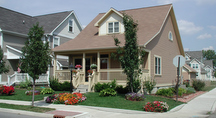Ensure Zoning Policies Support a Diversity of Housing Types  By comprehensively examining and revising zoning policies to expand the diversity of available housing options, communities can both increase the supply of homes affordable to working families and meet a greater range of constituents' housing needs | Adopt Expedited Permitting and Review Policies  Building permits, zoning variances, and other necessary approvals can be very time-consuming, and costly, to obtain. By streamlining and expediting the approvals process, jurisdictions make it easier for the market to deliver affordable homes. |
Revise Impact Fee Structures  In many places, impact fees are a key source of revenue for covering the infrastructure costs associated with new homes. Revision of impact fee structures to more equitably allocate these costs can help to increase the availability of affordable homes. | Adopt "Rehab Codes" to Facilitate Rehabilitation of Older Homes  By adopting special building codes designed to facilitate the rehabilitation of existing structures, communities can encourage the redevelopment of older, more affordable homes without compromising resident safety. |